Check out the top 15 milk brands in the USA. Which brand tops in quality and consumer trust? Explore our rankings to find your ideal dairy fit.
Have you ever pondered how pouring milk into your cereal every day represents a complicated, multibillion-dollar industry? Milk is a robust industry in the United States, with several brands fighting for shelf space. The milk industry’s versatility provides something for everyone’s taste and lifestyle, from organic alternatives to those with added protein. Milk is more than just a commodity; it reflects personal preferences, environmental concerns, and health benefits. But have you considered which brand best suits your likes and values? Let’s explore the intriguing world of U.S. milk brands and find where your favorite ranks among the finest.
How We Ranked America’s Best Milk Brands
The finest milk brands in the United States were ranked using a multidimensional set of criteria to guarantee a thorough assessment of each brand’s market success and customer appeal. Revenue was the most crucial aspect since it quantified each brand’s performance and market share in the thriving dairy business in the United States.
Another critical factor was market presence, which measured how well each brand was known and dispersed throughout the country. This includes both availability in big retail chains and visibility in smaller marketplaces.
Consumer preferences are critical factors in influencing brand loyalty and product pleasure. These preferences were measured using various methods, including consumer surveys and sales data, which revealed which brands the public prefers.
Finally, product quality and examining each brand’s dairy product manufacturing standards and methods were critical. Examples include organic certification, ingredient sourcing, and ethical agricultural techniques.
The data and insights for these rankings came from various credible sources, including industry publications, financial statements, market research studies, and consumer feedback platforms. By combining these sources of information, the rankings provide a comprehensive picture of the present state of the US milk market.
15. Tillamook

Tillamook has a solid reputation for producing high-quality cheese and ice cream. Though the company is best known for its cheesemaking skills, its milk products maintain the same high standards and devotion to flavor and freshness. Tillamook’s concentration on traditional dairy processes and cooperative ownership assures its products are high-quality and ethically produced, which appeals to customers who value sustainability and flavor.
14. Land O’Lakes

Land O’Lakes, well-known for its butter and cheese, has a particular place in many American families. The brand’s dedication to quality and history has made it a popular option among customers looking for dependable and delectable dairy products. Its presence is often felt in kitchens where cooking and baking need the best ingredients, confirming Land O’Lakes’ popularity as a family favorite.
13. Horizon Organic

Horizon Organic is known for its organic milk and dairy products, appealing to health-conscious customers who value quality and sustainability. The business is devoted to providing milk from pasture-raised cows, guaranteeing that it is organic and ethically supplied. This commitment to organic agricultural standards appeals to customers looking for clean, sustainably produced dairy products, ensuring Horizon Organic’s position in the competitive milk market.
12. Borden Dairy Company
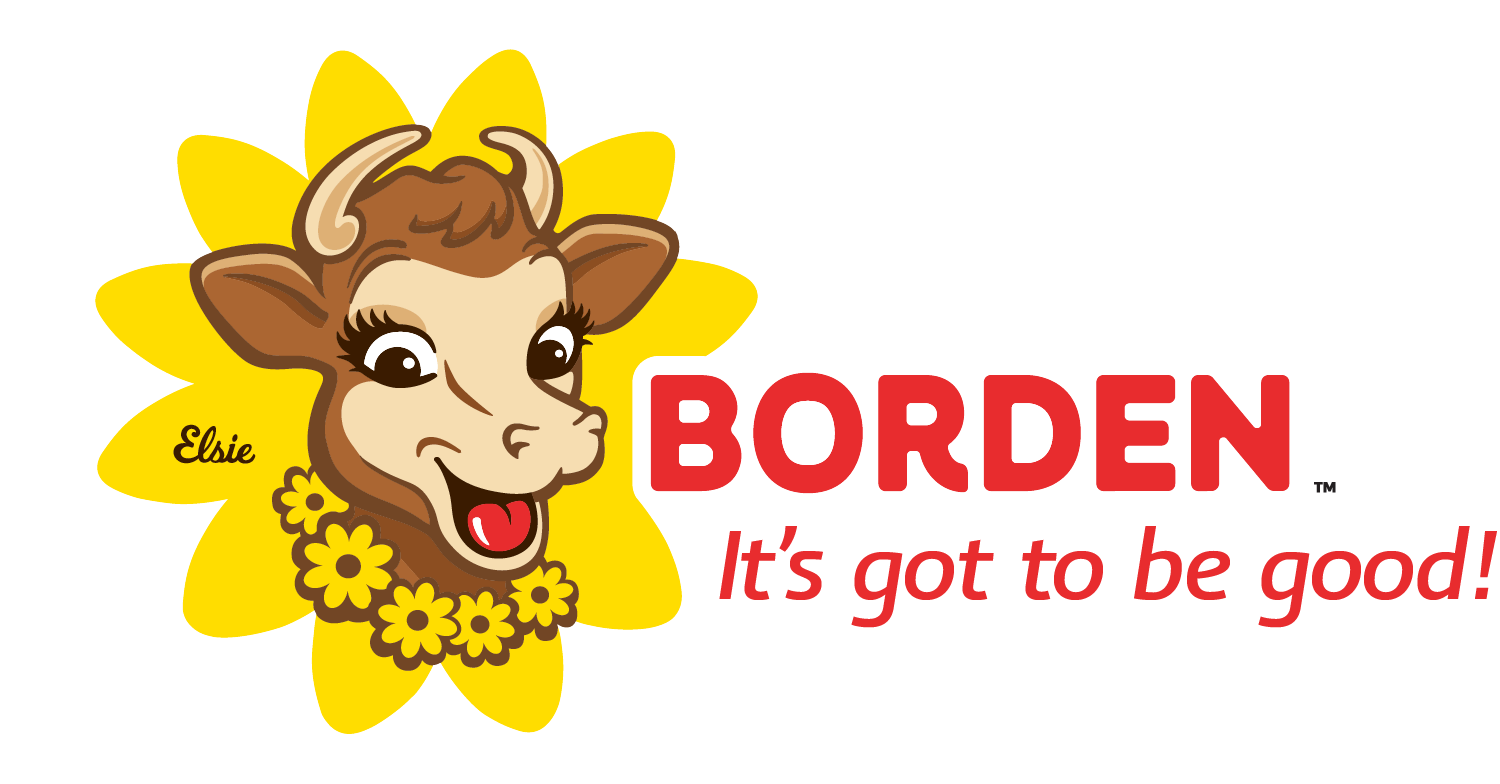
Borden Dairy Company is a well-known brand in the American dairy industry, thanks to its famous mascot, Elsie the Cow. Since her inception in the 1930s, Elsie’s warm and accessible image has come to represent the brand’s guarantee of nutritious and high-quality milk products. This effective marketing strategy reinforced Borden’s business reputation and increased customer trust throughout the years. The firm focuses on producing milk devoid of artificial growth hormones, aligning with customer desires for transparency and natural ingredients.
Furthermore, Borden Dairy’s dedication to quality extends beyond product delivery to cultivating a trustworthy connection with customers. The market effect of such a strategy may be seen in their stated yearly sales of $1.4 billion, indicating a strong position in the US dairy industry. This financial success demonstrates their ability to exceed customer expectations while maintaining trust. Borden’s ability to combine history with quality assurance in a competitive sector appeals to consumers who value heritage and dependability in their dairy purchases.
11. Yoplait

Yoplait is a well-established brand that has long been a favorite among yogurt enthusiasts across the United States. Known for its wide variety of yogurt products, Yoplait has captured a significant share of the dairy market by appealing to a broad audience. The brand ensures something for everyone, from classic fruit-flavored yogurts to more adventurous blends. Additionally, Yoplait emphasizes using high-quality ingredients, making it a trusted choice among consumers seeking taste and nutritional benefits.
10. Hood

Hood is a powerful force in the United States dairy industry. It is known for its diverse product offerings, which have helped it establish a strong market position. The brand’s offers include regular milk, varied creams, flavored milk products, and a noteworthy selection of lactose-free options. This versatility allows it to efficiently cater to customers with dietary limitations or preferences, creating an inclusive brand image. Hood has successfully appealed to a wide demographic by using strategic product innovation and an excellent grasp of customer wants, establishing itself as a prominent participant in the ever-changing dairy sector.
9. Chobani
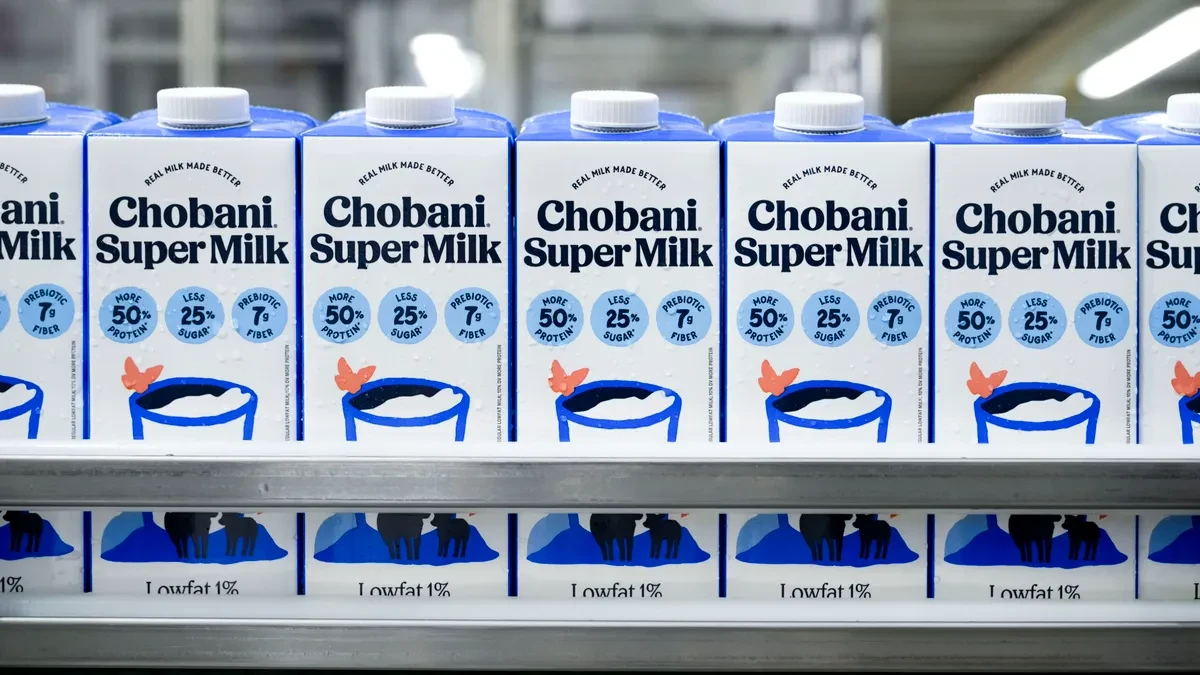
Chobani has established a strong presence in the US dairy industry due to its well-regarded Greek yogurt selections. In response to rising customer demand for healthier alternatives, Chobani has prioritized natural product ingredients. This dedication resonates strongly with health-conscious customers, making Chobani popular among those looking for delicious yet healthy dairy products.
Chobani prides itself on not using artificial preservatives or sweeteners, earning it a loyal fanbase. Beyond yogurt, the company continues to innovate by extending its product range to include oat milk and other non-dairy options, appealing to a larger audience of health-conscious and lactose-intolerant people. Chobani’s focus on health and well-being and its increasing product line enhances its position as a strong competitor in the dairy industry.
8. Prairie Farms Dairy

Prairie Farms Dairy has a significant influence in the Midwest, with an annual revenue of $3.4 billion. This outstanding result highlights the brand’s ability to execute a varied product strategy, comprising classic goods such as liquid milk, cottage cheese, ice cream, and specialized items. Prairie Farms uses its cooperative structure, which includes over 800 farm families, to procure high-quality raw milk, creating a consistent supply chain that supports its market stability and development potential.
Prairie Farms capitalizes on its geographical position in Illinois, a critical dairy-producing region. This enables the corporation to keep its competitive advantage by distributing items throughout several states. The brand’s commitment to regional customers is seen in its product innovation, which tailors offers to local consumers’ expectations and tastes. Furthermore, the company regularly participates in community-focused marketing efforts, bolstering its image as a dependable, indigenous brand that respects customer demands and regional sustainability.
Prairie Farms’ market approach combines conventional retail channels with rising digital sales platforms to expand its customer reach. The business constantly adjusts to changing customer trends by producing new, enticing goods, such as its latest foray into lactose-free and plant-based options. Prairie Farms firmly establishes itself in a competitive dairy marketplace by emphasizing product quality, regional affinity, and adaptable marketing.
7. Dean Foods
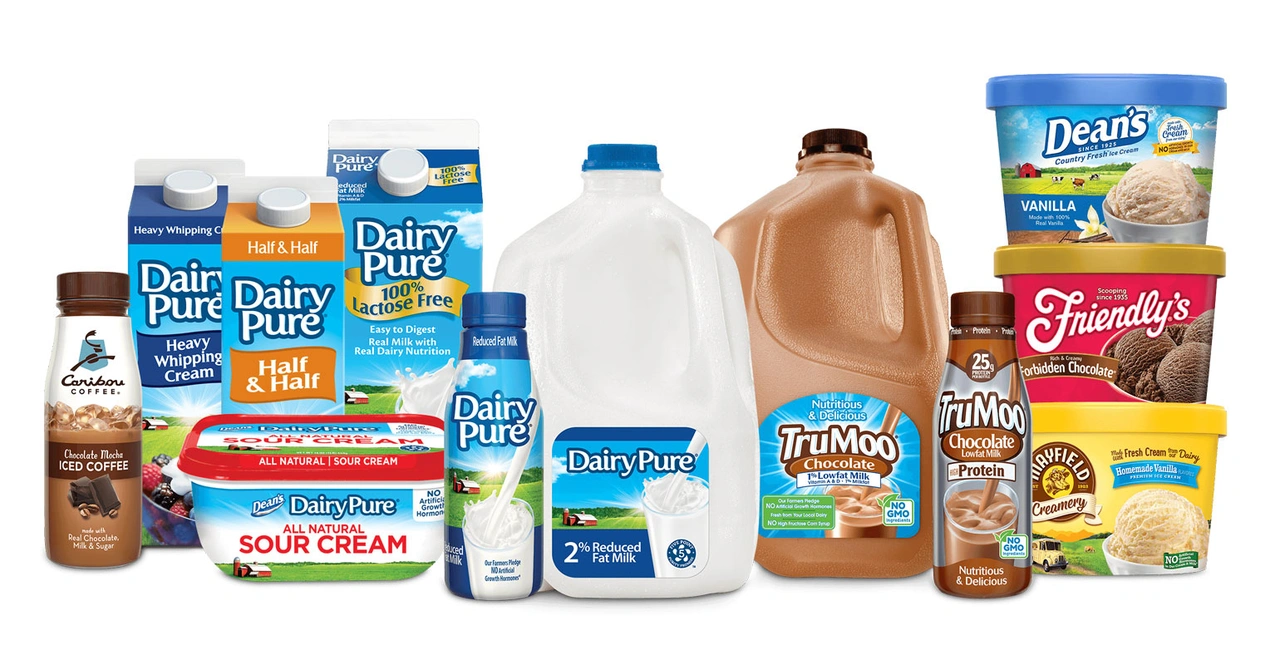
Dean Foods is a veteran in the American dairy sector, with a diverse product line that includes milk, creamers, ice cream, and other dairy products. Dean Foods, which operates under various brand names, including DairyPure and TruMoo, has successfully gained a significant market share by catering to varied customer tastes and preferences. This breadth of product offers strengthens its market position and generates widespread customer confidence. The company’s diverse portfolio guarantees it remains a popular choice among homes that value variety and quality. Despite enduring financial troubles in recent years, Dean Foods’ brand awareness remains high, thanks to decades of providing stable and dependable dairy products on which customers have grown to rely. Their dedication to innovation and satisfying customers’ changing needs strengthens their position in the competitive dairy industry.
6. Fairlife

Fairlife has carved itself into the dairy sector using unique milk processing procedures. Unlike conventional techniques, Fairlife employs ultrafiltration, which separates milk into its constituents, allowing for the selective removal or concentration of substances such as protein, lactose, and sugar. This technique produces milk products that are higher in protein and lower in sugar than standard types. Such health-conscious solutions have piqued the interest of customers who are becoming more concerned about their nutritional consumption, adding to Fairlife’s growing popularity.
Fairlife’s product selection goes beyond ordinary milk and includes creamers, protein drinks, and lactose-free options. This variety appeals to customer interests and positions the brand as a flexible market competitor. Fairlife has claimed strong market growth since its beginning, demonstrating its effective acquisition of a sizable portion of the US dairy business.
5. Nestlé USA

Nestlé USA, known internationally for its diverse products, has used its global reach to carve out a considerable place in the US dairy industry. Nestlé, as part of one of the world’s primary food and beverage businesses, has established a substantial presence in the dairy sector. The company’s ability to adapt foreign experience to local markets is shown by its excellent dairy product portfolio, which caters to a wide range of customer tastes, from conventional milk to innovative solutions such as dairy-based nutrition products.
Nestlé’s success in the United States is evident in its annual milk and ice cream sales, which total nearly $11.5 billion. This financial achievement demonstrates the brand’s strong market strategy and customer confidence in its constant quality and premium offerings. Nestlé’s product range increases its appeal, allowing it to dominate the ordinary consumer and luxury markets. Nesquik and Carnation are household brands demonstrating Nestlé’s dedication to nutrition, health, and well-being, which is critical to its business culture.
The company’s effect on the US dairy industry is significant; its creative product advancements and smart acquisitions have consistently established new standards that challenge rivals. Furthermore, Nestlé’s emphasis on sustainability and nutrition coincides with changing customer needs, reinforcing its leading position. Nestlé maintains and expands its influence in the ever-changing dairy business environment of the United States by reconciling customer requirements with corporate social responsibilities.
4. Dairy Farmers of America (DFA)
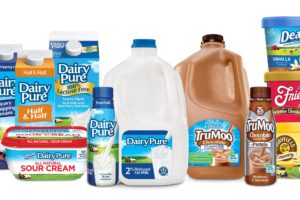
Dairy Farmers of America (DFA) is a critical stakeholder in the United States dairy business, exerting significant power via its extensive network and cooperative model. As one of the biggest cooperatives, DFA supports its members and leverages their combined power to achieve significant commercial success.
Financially, DFA has established its position with excellent net sales of more than $17 billion in 2020. This result demonstrates its successful strategy for leveraging scale and guaranteeing reliable product delivery. DFA’s diversified brand portfolio, which includes well-known brands such as Borden Cheese and Breakstone’s Butter, is crucial to sustaining market supremacy and customer confidence.
DFA’s market strategy strongly emphasizes innovation, sustainability, and customer engagement. Investing in new dairy processing processes and sustainable practices, the cooperative efficiently addresses changing customer needs for high-quality, ecologically friendly products. Its ability to combine traditional dairy quality with contemporary value-added solutions increases its appeal to a wide range of consumers.
Furthermore, DFA’s branding and customer interaction strategies emphasize its dedication to family farmers and the community. This concept distinguishes DFA from competitors and boosts customer loyalty and brand reputation. Consequently, DFA continues to manage the competitive environment with a strong strategy that reflects market changes and customer preferences.
3. Organic Valley
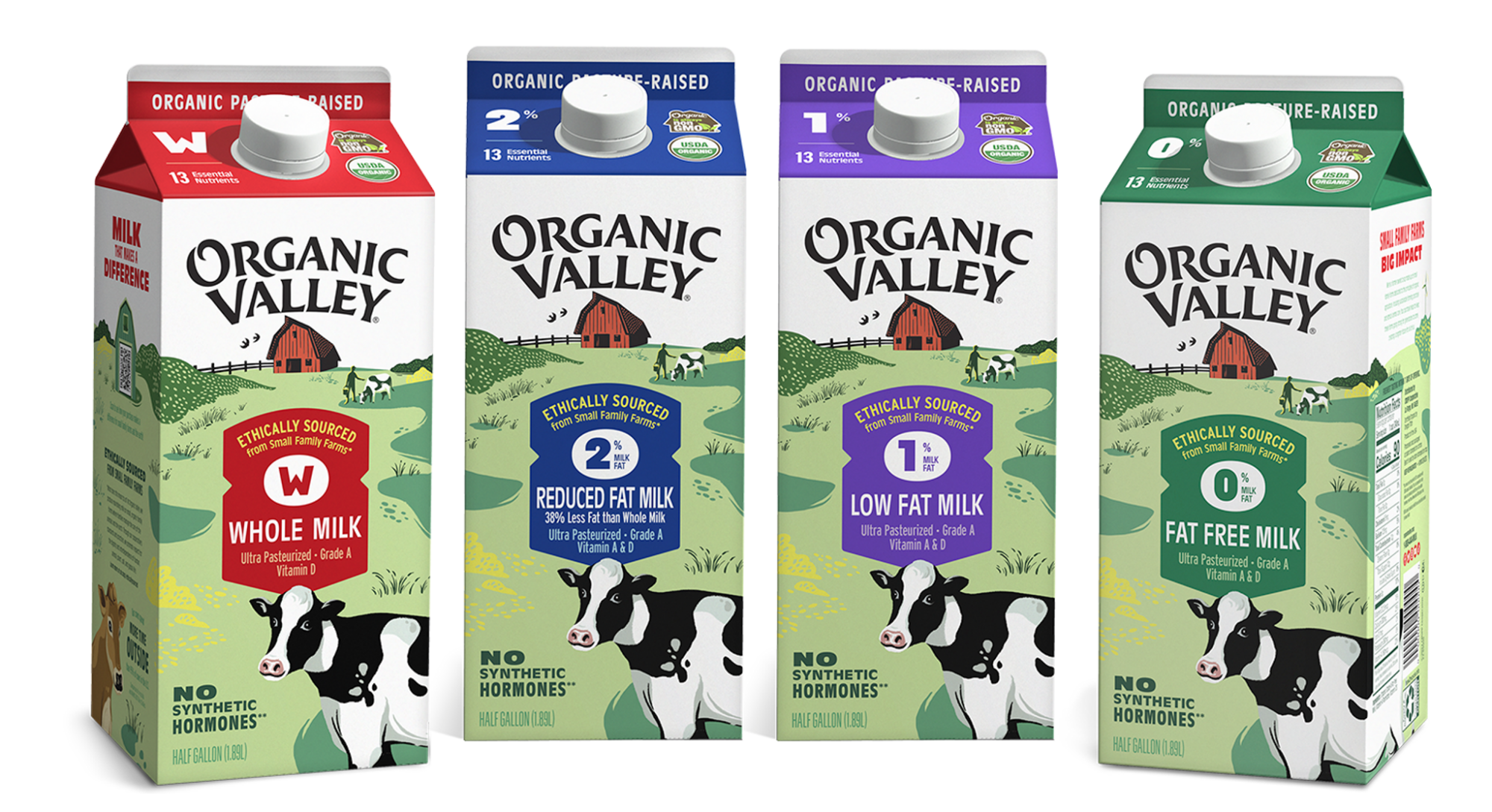
Organic Valley is more than simply a label on the grocery store shelf; it represents the strength of sustainable, organic farming. The cooperative is committed to acquiring milk from small, sustainable farms, ensuring that each gallon is organically and ethically produced. This focus on sustainability and organic certification is more than a marketing tool. It is a commitment to both customers and the environment. All of their goods are USDA-certified organic, indicating that they adhere to strict criteria. These efforts did not go unappreciated. Organic Valley has established a strong market presence fueled by consistent customer dedication to health, environmental stewardship, and ethical agricultural techniques.
Organic Valley has established a strong market position, especially among those who value organic and ethical products. With a substantial yearly income, the brand’s financial strength indicates customer confidence in its offerings. This trust is based not just on quality but also on the brand’s purpose and values. Organic Valley caters to a growing cohort of customers who associate organic with quality and caring – for themselves and the environment. Organic Valley is expected to acquire even more traction as this market group grows.
2. Stonyfield Organic
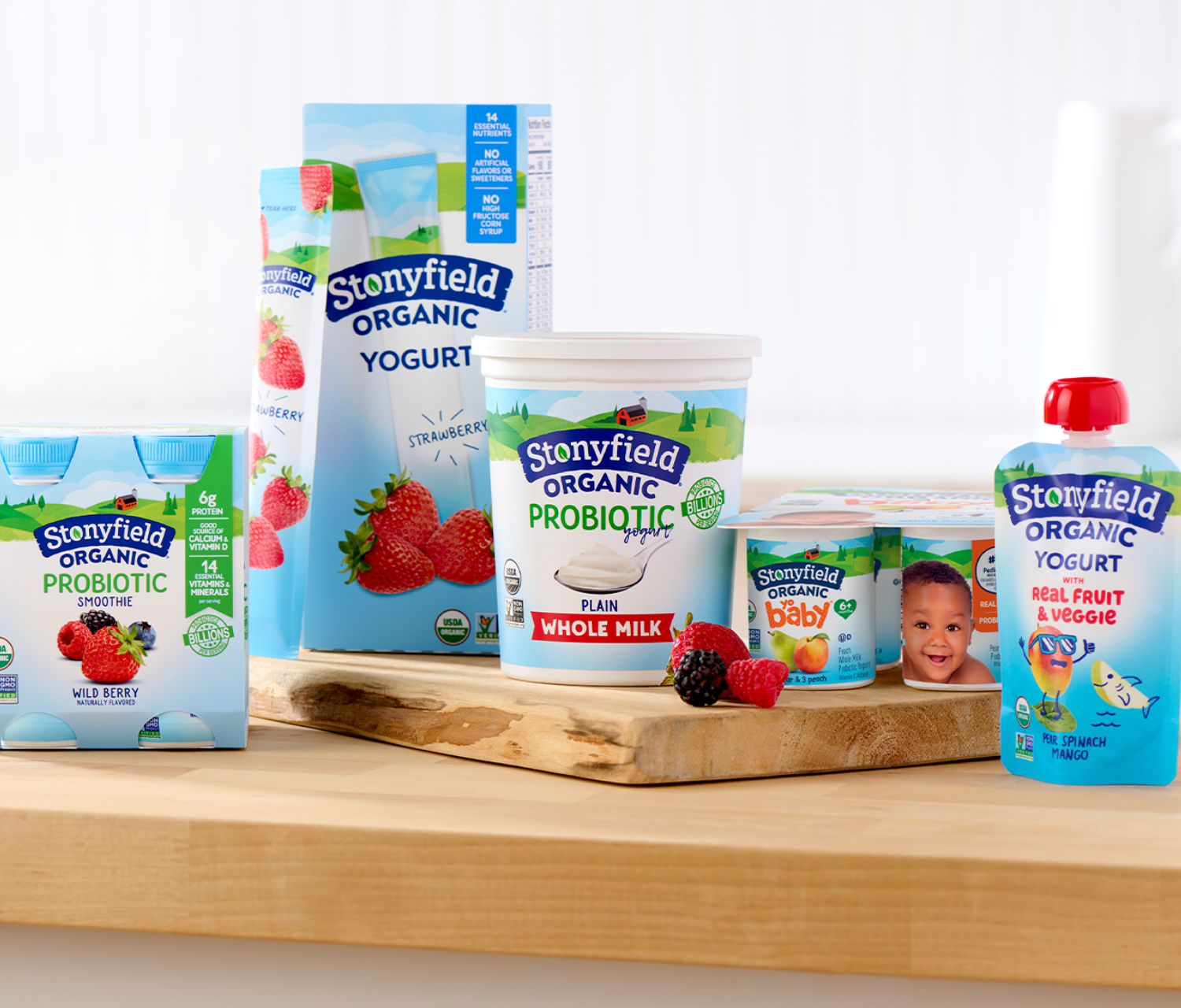
Its operating processes and product offerings reflect Stonyfield Organic’s dedication to sustainability and quality. Stonyfield positions itself as an organic dairy industry leader by getting milk from only grass-fed cows and conforming to USDA-certified organic standards. This commitment preserves the nutritional purity of its milk and yogurt products and appeals to customers becoming more conscious of environmental issues and health advantages. Stonyfield’s market position is bolstered by its reputation for clean and tasty products, which appeal to a small but rising customer base that appreciates environmentally responsible methods and high quality. The brand’s countrywide distribution increases its accessibility and popularity, reinforcing its reputation as a reliable name in the organic dairy business. It appeals to people who prioritize sustainability and ethical sources.
1. Dannon

The Dannon Company is the pinnacle of success in the US milk business. With a stunning $29.144 billion in sales, Dannon has an unrivaled market position that competitors strive for. This financial success is due to its volume, significant customer loyalty, and market penetration.
What makes Dannon stand out from the crowd? It is not only about producing dairy. Products. Dannon has built a diversified portfolio beyond regular milk, most notably yogurt. This variety appeals to many customer tastes, strengthening its brand visibility.
Moreover, Dannon’s capacity to innovate is critical. Dannon consistently creates goods that meet changing customer needs, including health-conscious and sustainability-focused solutions. Dannon’s versatility distinguishes it from its rivals and cements its supremacy in the sector.
The Bottom Line
In evaluating the findings from our list of America’s top milk brands, variety, and innovation are essential characteristics of this thriving business. From Dannon Company’s unrivaled sales growth to Stonyfield Organic’s dedication to grass-fed sustainability, each brand demonstrates distinct characteristics contributing to market success. These firms cater to a wide range of customer preferences, from Fairlife’s ultrafiltered milk, which appeals to health-conscious people, to Hood’s lactose-free alternatives, which fulfill particular dietary requirements.
Have you settled on a favorite among these top-performing companies, or do you often swap between them depending on what’s essential—organic sourcing, product diversity, or sustainability practices? Your personal preferences and broader environmental and ethical considerations influence your milk decision. We would love to hear your opinions! Share your thoughts in the comments section below, or interact with others to see how your perspectives overlap or vary. Let us keep the discourse flowing like a new jug of milk!
Key Takeaways:
- The U.S. milk industry is vast and competitive, with numerous brands excelling in revenue, market presence, and consumer trust.
- Dannon leads the rankings as the top milk brand in the U.S., backed by its substantial revenue and diverse product offerings.
- Organic options like Organic Valley and Stonyfield Organic emphasize sustainability and quality, catering to a growing consumer demand for clean, organic products.
- Fairlife stands out with its innovative ultrafiltered milk offerings, notable for higher protein and lower sugar content.
- Brand equity and consumer trust are major factors influencing the success of milk brands in the competitive U.S. market.
Summary:
The article examines the 15 leading milk brands in the United States by evaluating them on revenue, market presence, and consumer preference, with Dannon at the forefront, boasting a substantial $29.144 billion in revenue. Brands like Dairy Farmers of America, Nestlé USA, Fairlife, and Stonyfield Organic also feature prominently due to their strong market positions, emphasis on innovative products such as ultrafiltered and organic milk, and sustainable practices. This diverse list mirrors the varied tastes within the U.S. milk market, emphasizing product quality and consumer trust. The rankings are supported by data from industry publications, financial reports, consumer feedback, and market research, highlighting how variety and innovation are crucial factors in the industry’s success.
Learn more:
- What’s New in Dairy? Exciting Product Debuts from January to June 2024
- Philadelphia Cream Cheese Launches Innovative Cow-Inclusive Advertising Campaign: A New Shift in Marketing Strategy
- Hot Chicks Drink Whole Milk: What This Means for the Dairy Market
 Join the Revolution!
Join the Revolution!
Bullvine Daily is your essential e-zine for staying ahead in the dairy industry. With over 30,000 subscribers, we bring you the week’s top news, helping you manage tasks efficiently. Stay informed about milk production, tech adoption, and more, so you can concentrate on your dairy operations.







 Join the Revolution!
Join the Revolution!




